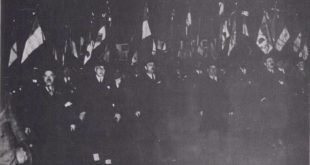IT BEGAN in the Russian capital, in the city which had been called St. Petersburg and was now called Petrograd. Bread had been rationed and on March 8, 1917, crowds of women and boys formed into long lines at the bakeries to get their share. Russians were used to waiting in line and usually they were patient, but on this day they were hungry. Besides, they were tired of the war, tired of the tsar, tired of living without hope. When they learned that there was no bread to be had, they lost their patience. They suspected that the bread was being held back to force a rise in prices. The women and boys rioted and the police were called out. Workers who had been on strike joined the rioters. They swarmed into the streets, marching and chanting, “We want bread! We want bread! We want bread!”
In the days that followed, more and more workers left their jobs and went on strike. There were more riots. The police lost control and mobs roamed the city, calling for bread, peace and freedom. They looted shops, tore down the emblems of the tsar from buildings, broke into police stations and let prisoners loose from the jails. Soldiers were ordered to stop the mobs and to shoot if necessary, but many of the soldiers were raw recruits who came from families of peasants or workers. They, too, wanted bread and peace and freedom. They refused to fire on the mobs; instead, they joined them in battling the police. Even the Cossacks, those fierce fighters who had never hesitated to beat down the people — even they mingled with the crowds. Scenes like this were repeated in city after city; all Russia wanted peace, bread and freedom.
With comparatively little bloodshed — less than 1,500 persons were killed — the people had brought about a revolution. The workers of Petrograd set up a soviet which took over part of the Tauride Palace for its offices. In another part of the same palace, an emergency committee of the Duma met. Soldiers refused to take orders from the tsar and without the army he had no power. On March 15, Nicholas agreed to give up the throne and turn it over to his brother, the Grand Duke Michael. Michael refused to accept it and at last Russia had no tsar. With the support of the Petrograd soviet, the Duma set up a provisional, or temporary, government. It was to call an election of a Constituent Assembly, or parliament. Meanwhile, the tsar and his family were placed under arrest.
The next few months were months of excitement, confusion and uncertainty. Both the provisional government and the Petrograd soviet issued orders and often it was hard to tell which was ruling the country. The Russians had overthrown the tsar — but what were they to do now? Should they try to build a democracy modeled on that of England? Or should they try a mild form of socialism? Or should they go on with the revolution until workers and peasants governed according to the ideas of Karl Marx? There were other questions to be decided as well. Should they continue the war or make a separate peace with Germany? How could they get the country back on its feet? How could they get the factories working and the trains running? Above all, how could they get enough food for the people?
The Russians had made a revolution without any real leadership, but now the professional revolutionists quickly became active. So did members of other parties. Bolsheviks, Mensheviks, Social Revolutionaries, Cadets, moderate liberals and men of every shade of opinion appealed to the people for support. They made speeches and put out newspapers. They issued slogans and announcements. Meetings were held on street corners, in factories and in buildings once open only to the aristocrats. Soldiers and sailors came streaming back from the front to join the crowds arguing politics.
Out of all the turmoil, two men rose to prominence. One was Alexander Kerensky, who was at first, minister of justice, then war minister and finally head of the provisional government. A moderate socialist, he was a skillful orator, young and full of energy. The other man was Lenin.




